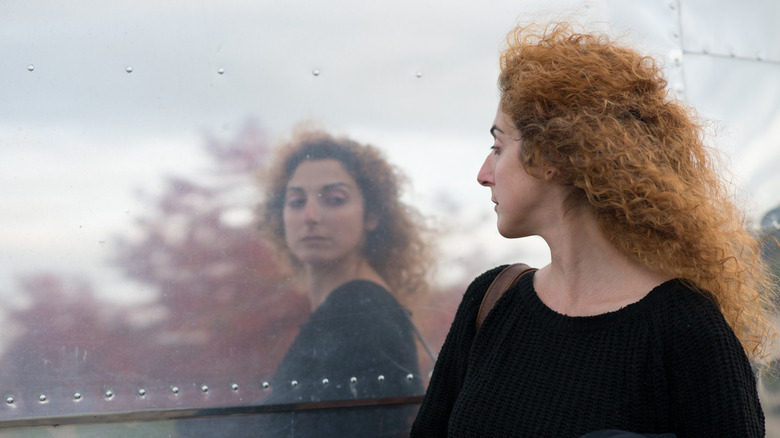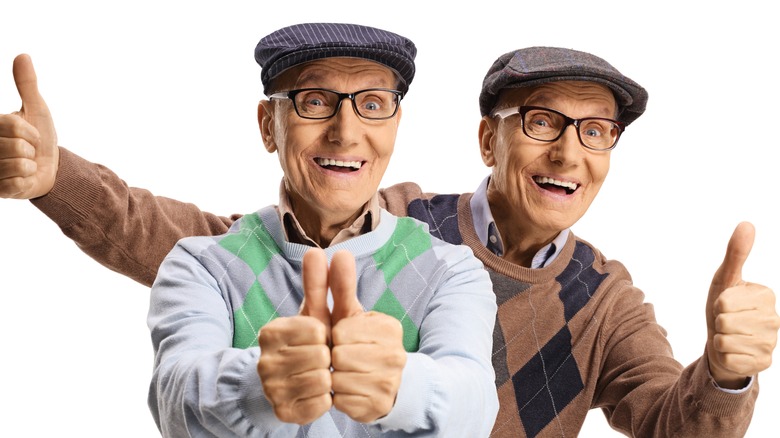What Are Your Chances Of Finding Your Doppelgänger?
Do you have an evil twin somewhere running around the world? Or some long-lost not-sister who looks exactly like you even though you've never met? In German, the word doppelgänger means "double-goer." Essentially, it refers to a biologically unrelated person who looks exactly like you (per How Science Works). In ancient folklore, the idea of a doppelgänger was a bit more sinister than that, though. According to Britannica, a doppelganger was usually an wraith (apparition) or replica of somebody, and running into it was considered a sign that you were about to die.
Perhaps it's a good thing that the possibility of finding a real doppelgänger is a lot trickier in part because we don't have a proper definition of what "looking exactly like you" means. According to Discover Magazine, there's no official scientific definition of doppelgänger –- what do you measure, what do you compare, and what kind of data do you collect which confirms that two people are exactly the same? We simply don't have a set of rules to follow.
Even people who claim to have found their doppelgänger might be disappointed once science steps in. In a study published by the International Journal of Legal Medicine, scientists found that once you submit two people who look similar to each other to eight different measurements, it turns out the numbers just don't match.
Could nature even create a doppelgänger?
Let's think of the idea of a doppelgänger from different angles: Let's say you find somebody who "seems" to look like you. Similar face structure, same weight and height, eye color, and so on. Then subject all those similarities to a scientific test. Scientifically speaking, the chances that two faces are exactly the same are very close to zero, according to Discover Magazine.
In a 2015 study published in the Forensic Science International journal, scientists compared individuals in a database using 8 facial measurements, including the size of the nose, the shape of the jaw, ear length, head circumference, and more. They discovered that even matching just a few of those 8 characteristics was incredibly hard, making the idea of finding the perfect doppelgänger incredibly difficult
That doesn't mean you won't meet people who look similar enough as research suggests that there's a limited number of variations on certain things, like the shape of your face. But matches beyond the basics will more than likely be among related individuals as facial features are hereditary (per Discover Magazine). When it comes to non-biologically related individuals, though, nature just doesn't have the same "interest" in copying features. For example, a genetic study on the heritability of human facial size and shape found that we don't know much about the genes that affect facial shape and how differences are created –- a result of the very complex natural relationship of genes making us unique.
So what are your chances of running into your doppelgänger?
Sorry to disappoint you, but the chances are very tiny. If we're looking at faces only, the chances of finding your twin out there are about 1 in a trillion, (via How Stuff Works). According to the Population Reference Bureau, only about 117 billion people have ever lived on Earth since our first ancestors back in 50,000 B.C.E. Since a trillion equals 1,000 billions and just over 100 billion have ever lived on Earth, let's just say a casual encounter with a mysterious twin is unlikely.
If you're adding body similarities, things get even harder. According to a study in the International Journal of Legal Medicine, it's even harder to match body measurements than face measurements. Turns out that while Mother Nature might create some repetition when putting faces together, body variations are even bigger. If you use eight body measurements (instead of facial measurements) to try and find your doppelgänger, your chances will fall to one in a quintillion.
This means that even if you went back a few thousands of years to look for your twin, you might just be out of luck. Then again, as Discover Magazine states, there are about 2 billion new people on the planet every decade. Maybe your doppelgänger will show up one day in the future. But while exact matches seem really impossible, what about big similarities where those measurements are just a little bit off?
So has it ever happened?
There are many stories of people claiming to have found their doppelgänger, but before the Internet (and social media), proving it was a bit tricky. Today, you can even find celebrities that often get confused for each other, including Dax Shepard and Zach Braff, and Jessica Chastain and Bryce Dallas Howard. While a closer look will expose many differences between their faces, at first glance, the Hollywood stars do resemble each other (via Today).
Curious about a potential doppelgänger out there? The website Twin Strangers gives you a chance to search for yours using facial recognition software. While you might not receive an exact, you might find a "close enough" match. All you have to do is upload a photo and click search (per Discover Magazine). The site even has a YouTube video chronicling the experience of some of its members. But as you'll see, its matches aren't exactly doppelgänger-quality but close enough that you can see the similarities. A report by BBC agrees: If you're willing to ignore the little details that don't match and instead think of faces as a map, where you recognize details that look familiar, even if not photographically exact, then finding a doppelgänger is a lot more likely.



